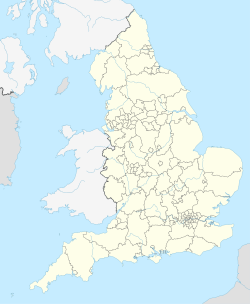History
In 1788, a Roman Catholic mission was founded in Gloucester. It was served by an Fr Gildart from a house on Berkeley Street. He did so with help from a £1,000 donation from a Miss Mary Webb. [3] In 1789, it became a parish. [4] In 1790, a Fr John Greenaway came to serve the parish and getting the chapel built. It was dedicated to St Peter ad Vincula and was built on London Road. It was registered in 1792. He died in 1800 and was buried in the chapel. [5]
In 1850, during the same year as the restoration of the English hierarchy, a Fr Leonard Calderbank became parish priest. [5] [6] With the increasing Catholic population of the city, he planned for a larger church to accommodate the congregation. In 1857, a £1,000 gift from a Frances Canning was given for the construction of the church [5] [6] and subscriptions were given by the local congregation. [2]
The presbytery, designed by Alexander Scoles, was built in 1879–80.
Architecture
In 1859, the chapel on the site of the church was demolished. Construction on the church started in 1860. Gilbert Blount was commissioned to build a Gothic Revival church. [2] In 1867, the neighbouring presbytery was demolished to allow space for construction of a longer nave, a tower and spire. [5] [6] On 8 October 1868, the church was consecrated. [4] In 1880, a new presbytery was built. [5] [6]
Interior
A triptych by Mayer of Munich, acquired by Canon Case in Paris. The stained glass is by Hardman & Co. and Clayton and Bell, who also did the original painting scheme in the sanctuary and Lady Chapel. The painted high altar and reredos in the sanctuary were designed by Blount, as was the carved and arcaded circular stone pulpit, a gift of Miss Canning. [7] In the sanctuary are the carved figures of our Lady, St Joseph, St. Gregory, St. Augustine, St. David and St. Willstan. [8]
This page is based on this
Wikipedia article Text is available under the
CC BY-SA 4.0 license; additional terms may apply.
Images, videos and audio are available under their respective licenses.



